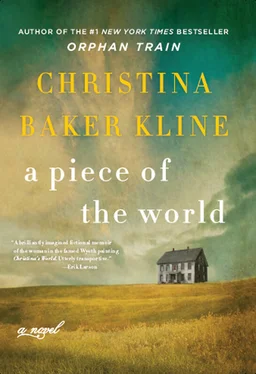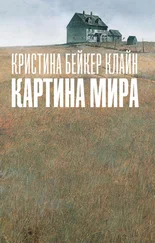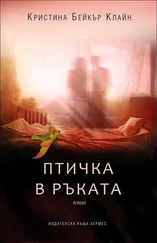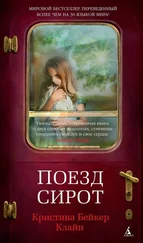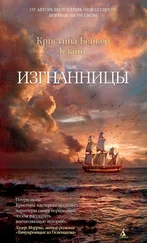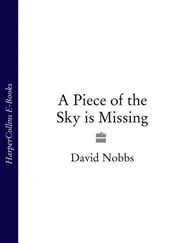“Why you crying, Mama?” Al asks.
“Because your sister is going to get well.”
I remember her saying this, but it will be years before I understand what it means. It means my mother was afraid I might not get well. They were all afraid—all except Alvaro and me and the unborn baby, each of us busy growing, unaware of how bad things could get. But they knew. My grandmother, with her three dead children. My mother, the only one who survived, her childhood threaded with melancholy, who named her firstborn son after her brother who drowned in the sea.
A DAY PASSES, another, a week. I am going to live, but something isn’t right. Lying in the bed, I feel like a rag wrung out and draped to dry. I can’t sit up, can barely turn my head. I can’t move my legs. My grandmother settles into a chair beside me with her crocheting, looking at me now and then over the top of her rimless spectacles. “There, child. Rest is good. Baby steps.”
“Christie’s not a baby,” Al says. He’s lying on the floor pushing his green train engine. “She’s bigger than me.”
“Yes, she’s a big girl. But she needs rest so she can get better.”
“Rest is stupid,” Al says. He wants me back to normal so we can run to the barn, play hide-and-seek among the hay bales, poke at the gopher holes with a long stick.
I agree. Rest is stupid. I am tired of this narrow bed, the slice of window above it. I want to be outside, running through the grass, climbing up and down the stairs. When I fall asleep, I am careering down the hill, my arms outstretched and my strong legs pumping, grasses whipping against my calves, steady on toward the sea, closing my eyes and tilting my chin toward the sun, moving with ease, without pain, without falling. I wake in my bed to find the sheet damp with sweat.
“What’s wrong with me?” I ask my mother as she tucks a fresh sheet around me.
“You are as God made you.”
“Why would he make me like this?”
Her eyelids flicker—not quite a flutter, but a startled blink and long shut eye that I’ve come to recognize: It’s the expression she makes when she doesn’t know what to say. “We have to trust in his plan.”
My grandmother, crocheting in her chair, doesn’t say anything. But when Mother goes downstairs with the dirty sheets, she says, “Life is one trial after another. You’re just learning that earlier than most.”
“But why am I the only one?”
She laughs. “Oh, child, you’re not the only one.” She tells me about a sailor in their crew with one leg who thumped around deck on a wooden dowel, another with a hunchback that made him scuttle like a crab, one born with six fingers on each hand. (How quickly that boy could tie knots!) One with a foot like a cabbage, one with scaly skin like a reptile, conjoined twins she once saw on the street . . . People have maladies of all kinds, she says, and if they have any sense, they don’t waste time whining about them. “We all have our burdens to bear,” she says. “You know what yours is, now. That’s good. You’ll never be surprised by it.”
Mamey tells me a story about when she and Captain Sam were shipwrecked in a storm, cast adrift on a precarious raft in the middle of the ocean, shivering and alone, with scant provisions. The sun set and rose, set and rose; their food and water dwindled. They despaired that they would never be rescued. She tore strips of clothing, tied them to an oar, and managed to prop this wretched flag upright. For weeks, they saw no one. They licked their salt-cracked lips and closed their sunburned lids, resigning themselves to their all-but-certain fates, blessed unconsciousness and death. And then, one evening near sundown, a speck on the horizon materialized into a ship heading directly toward them, drawn by the fluttering rags.
“The most important qualities a human can possess are an iron will and a persevering spirit,” Mamey says. She says I inherited those qualities from her, and that in the same way she survived the shipwreck, when all hope was lost, and the deaths of her three boys, when she thought her heart might pulverize like a shell into sand, I will find a way to keep going, no matter what happens. Most people aren’t as lucky as I am, she says, to come from such hardy stock.
“SHE WAS FINE until the fever,” Mother tells Dr. Heald as I sit on the examining table in his Cushing office. “Now she can barely walk.”
He pokes and prods, draws blood, takes my temperature. “Let’s see here,” he says, grasping my legs. He probes my skin with his fingers, feeling his way down my legs to the bones in my feet. “Yes,” he murmurs, “irregularities. Interesting.” Grasping my ankles, he tells my mother, “It’s hard to say. The feet are deformed. I suspect it’s viral. I recommend braces. No guarantee they’ll work, but probably worth a try.”
My mother presses her lips together. “What’s the alternative?”
Dr. Heald winces in an exaggerated way, as if this is as hard for him to say as it is for us to hear. “Well, that’s the thing. I don’t think there is one.”
The braces Dr. Heald puts me in clamp my legs like a medieval torture device, tearing my skin into bloody strips and making me howl in pain. After a week of this, Mother takes me back to Dr. Heald and he removes them. She gasps when she sees my legs, covered with red festering wounds. To this day I bear the scars.
For the rest of my life, I will be wary of doctors. When Dr. Heald comes to the house to check on Mamey or Mother’s pregnancy or Papa’s cough, I make myself scarce, hiding in the attic, the barn, the four-hole privy in the shed.
ON THE PINE boards of the kitchen floor I practice walking in a straight line.
“One foot in front of the next, like a tightrope walker,” my mother instructs, “along the seam.”
It’s hard to keep my balance; I can only walk on the outsides of my feet. If this really were a tightrope in the circus, Al points out, I would have fallen to my death a dozen times already.
“Steady, now,” Mother says. “It’s not a race.”
“It is a race,” Al says. On a parallel seam he steps lightly in a precise choreography of small stockinged feet, and within moments is at the end. He throws up his arms. “I win!”
I pretend to stumble, and as I fall I kick his legs out from under him and he lands hard on his tailbone. “Get out of her way, Alvaro,” Mother scolds. Sprawling on the floor, he glowers at me. I glower back. Al is thin and strong, like a strip of steel or the trunk of a sapling. He is naughtier than I am, stealing eggs from the hens and attempting to ride the cows. I feel a pit of something hard and spiky in my stomach. Jealousy. Resentment. And something else: the unexpected pleasure of revenge.
I fall so often that Mother sews cotton pads for my elbows and knees. No matter how much I practice, I can’t get my legs to move the way they should. But eventually they’re strong enough that I can play hide-and-seek in the barn and chase chickens in the yard. Al doesn’t care about my limp. He tugs at me to come with him, climb trees, ride Dandy the old brown mule, scrounge for firewood for a clambake. Mother’s always scolding and shushing him to go away, give me peace, but Mamey is silent. She thinks it’s good for me, I can tell.
I WAKE IN the dark to the sound of rain drumming the roof and a commotion in my parents’ bedroom. Mother groaning, Mamey murmuring. My father’s voice and two others I don’t recognize in the foyer downstairs. I slip out of bed and into my woolen skirt and thick socks and cling to the rail as I half fall, half slide down the stairs. At the bottom my father is standing with a stout red-faced woman wearing a kerchief over her frizzy hair.
Читать дальше
Конец ознакомительного отрывка
Купить книгу
